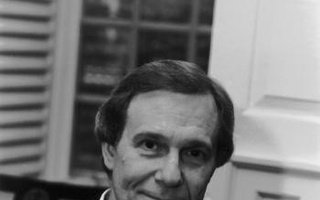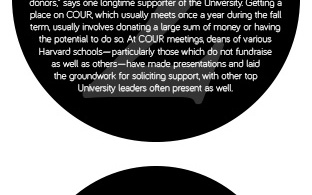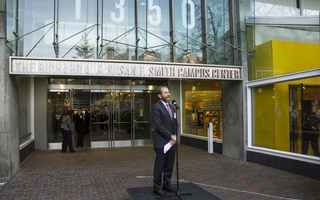{shortcode-1c46732c6b3c1bab6de7ffd9e2449e5b908dc588}
When Harvard’s public face is most needed to sell the University to donors in London, Rio de Janeiro, or Hong Kong, being buried in papers and committee work in Massachusetts Hall does not do much good. To inspire donors and seed their stake in Harvard’s expensive list of capital campaign priorities, University President Drew G. Faust takes to the road.
With a capital campaign to run and dollars to raise, Faust has been spending an increased amount of her time traveling, headlining alumni events, and speaking with donors. In the last few years, Faust’s travel itinerary has spanned not just the United States, but at least four continents, as she visited cities ranging from New York to Seoul and Mumbai. Faust says that she now spends up to 50 percent of her time on campaign-related efforts, travel among them.
“It’s a year that has been defined in many ways by the campaign and by the various events University-wide and at the individual schools relating to the campaign, so that’s been a standing part of my life since the launch in September,” Faust says.
She is not alone. As Harvard embarks on an ambitious, $6.5 billion fundraising drive, leaders across Harvard’s schools have adjusted their schedules, exchanging time in their Cambridge or Boston offices for airports and hours on the road. Eight months into the Harvard Campaign’s five-year public phase, regular events across the world attract large audiences of alumni and other potential donors, along with high-profile Harvard administrators who deliver remarks urging audiences to give.
University officials see traveling for the campaign as a means to solicit donations outside of Cambridge, but it also offers them a chance to school alumni around the globe in the University’s priorities. And as they increasingly leave their desks for the road, top administrators take their work—and their cell phones—with them, stretching their schedules and prompting some to question whether the University’s leaders should more highly prioritize their day-to-day roles on campus.
DIVIDING THEIR TIME
Along with Faust, Harvard’s other central administrators in particular focus much of their attention on the University-wide drive—and its priorities—they are tasked with spearheading. Provost Alan M. Garber ’76 says he spends 30 to 50 percent of his time on campaign-related activities, even if he spends “much less time” traveling than Faust.
Deans of the University’s various schools likewise devote time on the job to fundraising and making pitches to donors. Dean of the Faculty of Arts and Sciences Michael D. Smith says he spends half his time campaigning for FAS, the school whose $2.5 billion goal indicates that it will benefit most from The Harvard Campaign, which altogether is poised to set the international record for drives among institutions of higher education.
Dean of Harvard Business School Nitin Nohria writes in an email that the campaign “has certainly required my attention and focus.” Kennedy School Dean David T. Ellwood '75 similarly says he is spending an increased amount of time on the road and meeting with donors, though he did not specify a percentage.
These efforts take up not only a great deal of time, but also require far-reaching travel. Faust has flown across the country—to Los Angeles and Washington, D.C., among other cities—and across the globe to promote the University and its campaign priorities to alumni and potential donors.
{shortcode-93b45c7b677837ecedbfb4775465d0e210ddbbef}
She spoke in Davos, Switzerland, and London in January, and at a “Your Harvard: New York City” event in mid-May, where she addressed Harvard affiliates on a decommissioned aircraft carrier on the Hudson River.
Even day-to-day events that involve interacting with students or alumni seemingly independent of the campaign can become campaign-related if donors are in attendance. Varsity basketball games, for which alumni fans—some of them prominent donors—regularly descend on Cambridge, are a recent example.
Read more in University News
One Harvard, One Campaign?Recommended Articles
-
Our Democracy Is Broken, But We Can Fix ItIndeed, in the wake of Citizens United and years of weak campaign finance laws, there is a lot we do not know about how our elected officials reached our TVs, our YouTube videos, and our ballots in the endless campaign leading up to Tuesday, November 6
-
Younger Crop of Donors Fueling Capital Campaign, Supporters SayHarvard has raised more than $900 million since the public launch of Harvard's capital campaign, and longtime supporters credit much of the progress to a new generation of donors.
-
Taxation or Donation?Without diminishing Mr. Griffin’s largesse, one of the structural factors that makes this donation possible is the longstanding preference in the tax code for charitable gifts that allows them to be tax-deductible.
-
 Q & A with Neil L. Rudenstine
Q & A with Neil L. Rudenstine -
 Popping the Question
Popping the Question -
 One Harvard, One Campaign?
One Harvard, One Campaign?













